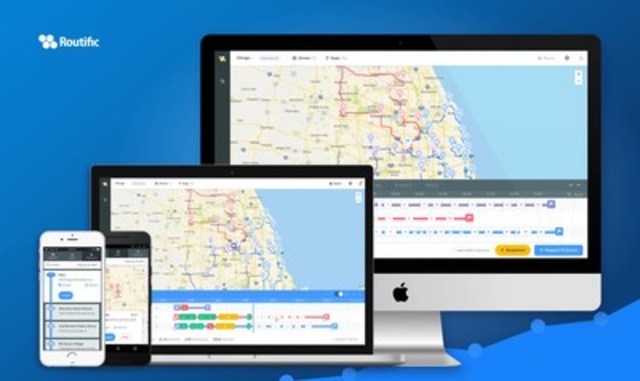TMCnet News
Routific revives businesses in the last mile delivery space as venture funding slowsRoute optimization software reducing costs for most expensive chunk of supply chain VANCOUVER, Feb. 28, 2017 /CNW/ - As venture funding slows, delivery startups grappling with fierce competition, low margins, and a multitude of operating challenges, are re-thinking their approach to the "scale first, profit later" business model.
Though investors have poured at least $9 billion into 125 on-demand delivery companies over the past decade – including $2.5 billion in 2016 – that trend is now drying up, according to a recent Reuters analysis. Venture capitalists are losing faith in on-demand, with some publicly admitting that their investments are likely to result in huge losses. So while some delivery businesses continue to resort to widespread discounting and artificially low consumer prices in the fight to become the next "Uber for X", many are turning away from the on-demand model. Instead, they have adopted a scheduled approach, allowing them to more efficiently plan their pickups and deliveries. "Delivery businesses are not impossible, but the approach needs to be put on its head – they need to focus on profitability right off the bat," said Marc Kuo, Founder and CEO of Routific, route optimization software that helps delivery businesses reduce up to 40% of their last mile delivery costs. "Unless you're at the scale of Uber, building a sustainable, profitable business is near impossible," Kuo said. "But we've seen a huge uptake with companies that are turning to a scheduled and predictable approach to their last mile logistics." A Costly "Last Mile" With the rise of e-commerce, transporting goods to their final destination – commonly referred to as the "last mile" – has never been more taxing and more costly. In some cases, the last mile can amount to up to 75% of total supply chain costs. The brutal economics of food delivery were recently made public with Maple, a meal delivery service in New York City whose profit margins have been eaten away by its last mile delivery operations. "The unit economics of last mile delivery operations can be summarized by a single blended KPI: cost per delivery," said Kuo, Routific's Founder and CEO. "To decrease the cost, you need to increase your delivery density. You can achieve this either with sheer volume or with route optimization. The former is only accessible to heavily funded ventures at scale, while the latter is accessible to every delivery business." New Routing Platform Launches Today Following the immediate success of their first platform, Routific is announcing the launch of an even more comprehensive platform today. The new software is designed for delivery businesses whose core focus is building a profitable and self-sustaining business in the face of increased competition and funding scarcities. The new platform minimizes driving time by optimizing routes for an entire fleet of drivers, and includes the ability to track drivers' progress while they're on the road, increasing accountability for businesses who must answer to consumer expectations. Routific also provides end-of-day analytics to help businesses better understand how well their last mile delivery drivers are performing. "Up until recently, we were offering our customers a choice: on-demand or scheduling deliveries in advance," said Patrick Asdaghi, founder of FoodCheri, one of the fastest-growing food delivery companies in Paris. "We recently moved to a completely scheduled approach because we've seen positive unit economics and a positive customer experience with reliable delivery. Routific is instrumental in helping us calculate the best routes for our drivers to deliver those orders on time." About Routific: Named one of Fast Company's "World Changing Ideas", Routific is helping hundreds of businesses in 908 cities around the world – including Fortune 100 companies – streamline operations, increase efficiencies, and slash fuel spending by up to 40%. Routific investors include Techstars Chicago, Pallasite Ventures, Firestarter Fund, and Axiom Zen.
SOURCE Routific 
|


